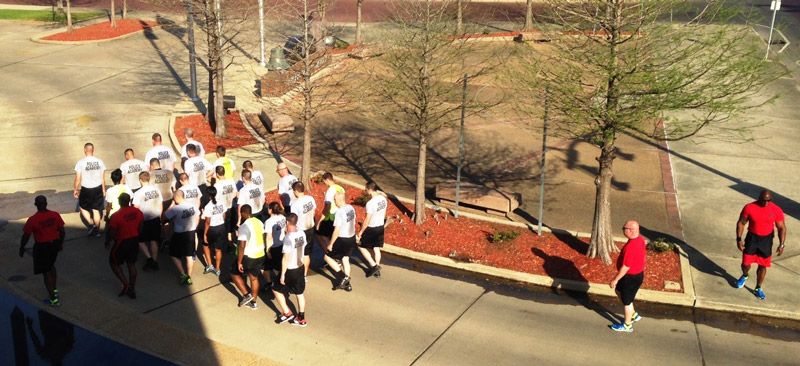Contact Information
- (318) 441-6500
- apd-training@cityofalex.com
- apd-academy@cityofalex.com

"Law Enforcement is a profession with a high price in a democratic society. The goal of the Training Division is to see that police officers acquire the common body of knowledge necessary for them to assume their role in helping communities establish a crime free environment that is safe for all."
The Training Division is an integral part of the police department’s duty to maintain the highest standards and ethical values in the hiring and training of new and current police department employees.
An essential element found in all successful organizations is a well-designed and implemented training program. A program that remains both committed to raising standards while remaining flexible. A program that incorporates into its very foundation, the concept that training must meet not only the needs of the organization, but must provide for the growth of its most important asset, its employees.
This commitment to training is the responsibility of the Police Training Division.
Field Training and Evaluation Program
One of the responsibilities of the Training Division is to provide on-the-job training for recruit officers after they have completed the 14-week POST Basic Training Academy. Upon successfully completion of the basic academy, officers are assigned to the Training Division for field training. The recruit officer must successfully complete the 24-week Field Training and Evaluation Program to retain employment with the agency as a Probationary Police Officer. While in the field training program, officers are trained through four training phases with three different Field Training Officers (FTOs). The primary FTO covers phases 1 and 4, while the other two FTOs handle the training in phases 2 and 3. The Field Training and Evaluation Program is rigorous and provides officers with competent, real-world training, which is dynamic when compared to the sterile training environment of the Basic Training Academy. The Field Training and Evaluation Program is a critical component of the employment selection / retention process. The transition from an academy environment to the streets is difficult and stressful for most recruit officers, which is why the role filled by the Field Training Officer is so important; the FTO that must assure that the transition between the two very different learning environments is smooth.
Detectives primarily investigate felony-level crime and provide criminal investigative support to the Patrol Division. They conduct a broad spectrum of criminal investigations to include deaths, sexual assault, armed robbery, burglaries, fraud, computer crimes and counter-drug operations. They search out the full facts of a situation, organize the facts into a logical summary of investigative data, and present this data to the District Attorney’s Office.
The Criminal Investigative Bureau also provides criminal intelligence and forensic investigative support for the Patrol Division. The Detectives assigned to this bureau work closely with other local, state, federal, and military law enforcement agencies to counter and investigate the most serious crimes.
Regardless of the type of crimes investigated, its performance has invariably been at or above the standards of its nationwide law enforcement agency peers.
Firearms Training Unit
Another component of the Training Division is the Firearms Training Unit. This entity is charged with providing ongoing firearms training for all sworn personnel. POST requires annual handgun qualifications for all peace officers. The Alexandria Police Department’s FTU is responsible for yearly qualifications with pistol, shotgun, and patrol rifle.

Alexandria Regional Police Academy
The Alexandria Police Department’s Training Division operates the Alexandria Regional Police Academy that provides basic peace officer’s training for its APD recruits and recruits form 9 local parish Sheriff’s Offices and approximately 45 municipal departments. This program provides 17 weeks of basic recruit training to all cadets and prepares them to pass the Louisiana Police Officers Standardized Training Exam. Some examples of the training provided are firearms, control tactics, physical training, classroom training, and scenario-based training.
The Academy provides progressive and comprehensive training to develop policing skills, enhance leadership abilities, and promote a solid ethical foundation to all police cadets. In addition, throughout the entire Basic Program, the Academy’s core values of professionalism, obligation, leadership, integrity, courage, and excellence are stressed and reinforced.
The cadets receive over 600 hours of basic recruit training, which exceeds the Louisiana State mandate by over 150 hours of training. Of the Louisiana State mandated material, cadets receive extra training in gangs, drugs, law, ethics, report writing, vehicle stops, control tactics, firearms, physical fitness, and law enforcement driving.
Also, cadets receive extra training that is not required by the State of Louisiana with classes such as terrorism awareness, diversity, technology awareness, and building entry tactics.
When cadets graduate from the Alexandria Regional Police Academy, they enter the world of policing with the knowledge and skills necessary to effectively perform their duties as police officers
